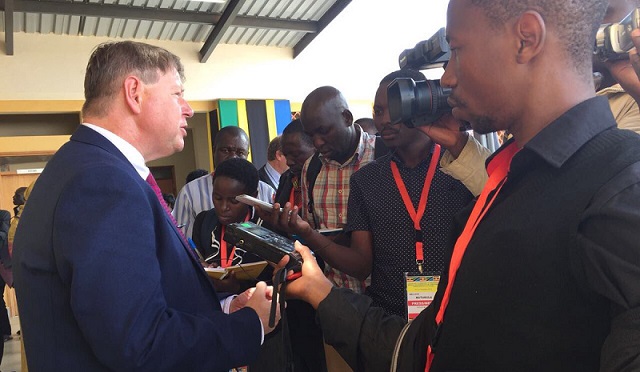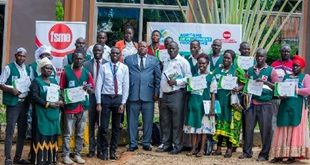
TradeMark East Africa invests US$117 bn in customs facilities
Kampala, Uganda | JULIUS BUSINGE | Doing business in East Africa has improved in the recent years with the operationalization of the One Stop Border Points (OSBP).
TradeMark East Africa (TMEA), through funding from UK’s Department for International Development (DFID) and Global Affairs Canada, has so far funded the construction and operationalisation of 15 OSBP including Busia, Malaba, Kabanga/Kobero; Holili/Taveta and Mirama Hill/Kagitumba across the region since 2010 among others.
The facilities includes; office buildings, roads and parking yards, cargo verification bays, scanner shed, passenger sheds, targeting booths, warehouse and canopies, ICT networks and hardware, furniture and institutional support to the border agencies.
Mutukula One Stop Border Post, which connects Uganda and Tanzania, was the latest to be launched by President Yoweri Museveni and John Pombe Magufuli on Nov. 09.Only Nimule/Elegu border that connects Uganda and South Sudan is yet to be completed.
Frank Matsaert, the Chief Executive Officer of TradeMark East Africa, said they expect a US$30 return for every dollar spent as the time for clearance at the region’s borders reduce going forward.
“Our investmentin these borders is geared towards trade facilitation in the region,” he said, “adding that for countries like Uganda to achieve middle income status, they must reduce on the transport costs.”
This is because OSBP works in a way that it brings together immigration and customs officials from two neighbouring countries under one roof at the border crossing point, doing away with need for trucks and persons to undergo clearance twice at both sides of the border.
For instance, preliminary survey since the operationalisation of Mutukula OSBP early this year, indicates that the time to cross from Uganda to Tanzania has reduced by 66% from 10 hours in 2011 to 3.4 hours 27 minutes in June 2017.
On the other hand, crossing from Tanzania to Uganda has reduced by 90% from 46 hours to 4.5 in June 2017.
This is the similar trend in other OSBP, according to Matsaert, without mentioning the exact amount of time that has been reduced as a result of the initiative.
This new development comes at the time Uganda is struggling to ease the cost of doing business. The recent ease of doing business ranking report by the World Bank indicated that Uganda dropped seven placesto 122 in the rankings out of 190 economies this year 2017.
President Museveni applauded the British Government for their support towards Uganda and the region in boosting trade activities and EAC integration process though TradeMark East Africa.
Business captains in Kampala as well as Uganda Revenue Authority (URA) have welcomed the new initiatives.
Issa Sekito, the spokesperson of Kampala City Traders Association (KACITA) in an interview with The Independent saidit is time for TMEA to also consider equipping traders with skills in corporate governance, innovations for their businesses to thrive.
“You can build infrastructure and leave people behind,” Sekito said, adding, “I know that they are doing that through Private Sector Foundation Uganda…but that is not enough; they need to deal with us directly.”
Doris Akol, the commissioner general at the URA said these initiatives have led to great strides in facilitating trade and also yielded tremendous revenues for Uganda and Tanzania.
In 2016 alone, revenue collection at Mutukula OSBPgrew by 110% from Shs 70.3billion in the financial year 2013/2014 to Shs147.7bn in financial year 2016/17 due to faster cargo clearance.
Fuel imports contribute about 36.3% of the total revenue that is collected at Mutukula OSBP, Akol said.
“Volume of imports has increased by 65% between 2013/2014to 2016/2017 with top imports being fuel, motor vehicles and spirits,” she said.
Besides funding OSBP, TMEA is also investing in automation of key government trade processes through Single Windows implementation, elimination of non-tariff barriers along the corridors, and improvement of port infrastructure at both Dar es Salaam and Mombasa ports to reduce dwell time and increase efficiency.
 The Independent Uganda: You get the Truth we Pay the Price
The Independent Uganda: You get the Truth we Pay the Price


